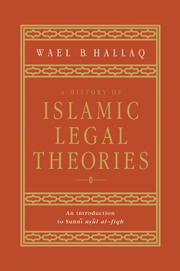6 - Crises of modernity: toward a new theory of law?
Published online by Cambridge University Press: 05 October 2013
Summary
THE BACKGROUND
as we have seen in chapters 2 and 3, a salient characteristic of pre-modern legal theory is the great attention it accords to the literal interpretation of the Quran and the Sunna. The language of these two sources was construed to have a direct and literal effect on law cases that required solutions. No amount of interpretation in this theory could have changed, for instance, the legal effect of the Quranic verse that allots the male heir twice the share of the female. Furthermore, the theological postulate that sustained most legal theories, of Ashʾarite inspiration, states that man's intellectual capabilities are thought to be insufficient to determine the rationale behind God's revelation. God's wisdom, deeply embedded in His Sharīʾa, is simply incomprehensible for humans. Thus, the rationales of rules in the revealed texts were to be sought solely in the inner structures of these texts: only what God chose to declare explicitly to be the ratio legis of a case was to be taken thus, and what He decided merely to allude to was to be subjected to an interpretive enquiry that was deemed to result in a probable judgment. But nothing more was to be attributed to God's motives and rationale.
- Type
- Chapter
- Information
- A History of Islamic Legal TheoriesAn Introduction to Sunni Usul al-fiqh, pp. 207 - 254Publisher: Cambridge University PressPrint publication year: 1997



